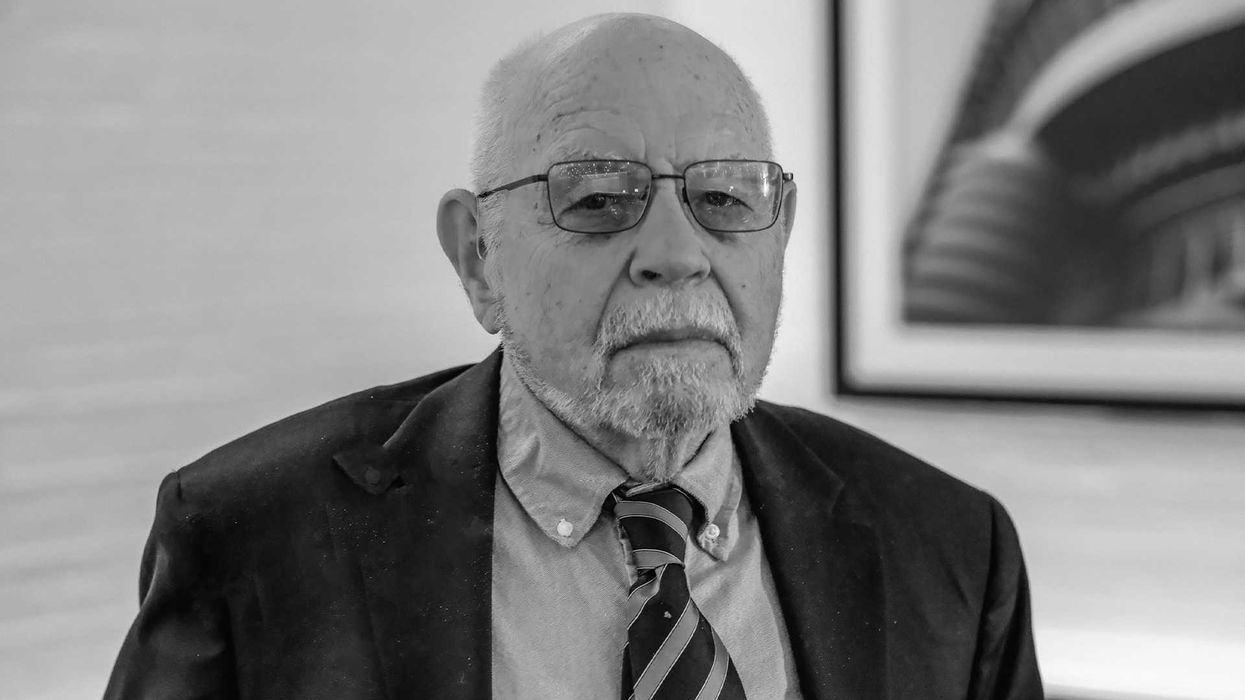
© 2026 Blaze Media LLC. All rights reserved.
Banished from the courts of power, he walked the desert for years—only to return as the oracle of a broken age.
Often, in intellectual history, a man doesn’t receive his proper due. Years later, people rediscover his works and realize a giant was walking amongst them. Rare is the chance for a man to come in from the cold and see his life’s work embraced and championed by the younger generation. But Professor Paul Gottfried is no normal man.
On a warm September afternoon at the National Conservatism Conference in Washington, D.C., I take a stroll with Gottfried to grab lunch at an empty, upscale Italian bistro around the corner from the conference chaos. We can’t seem to go more than a few feet before an eager twenty-something interjects with a request for a selfie or to sign a book or tell him how much his writings have meant to them. A bemused smirk rests on his features as the kids jostle into the photo; I feel a bit like I’m walking with a pop star rather than an octogenarian academic.
He’s just released a sprawling collection of essays from Passage Publishing, The Essential Paul Gottfried, Essays from1984–2024, which collects 40 years of polemics. Over grilled swordfish and beet salad, I’m able to spend a few hours with a man who built a career verbally jousting with a mainstream GOP that found his paleoconservatism odious.
I ask him if he sees himself vindicated. It’s clear his excommunication still stings.
“I absolutely despise these people who have played this game with me for the last 40 to 50 years. I think this is ridiculous, cowardly behavior.” He sips his iced tea. “My wife doesn’t like that very much. She thinks you should, you know, just go, go with the flow. And then I’m—then I have this pugnacious quality that is not serving me well in life.”
Movements that fear ideas will always seek to expel their most interesting minds.
It is a melancholy feature of intellectualdom that movements which profess themselves to be vigorous, open, and searching are so often governed like the Vatican at its most neurotic. One could be forgiven for thinking of the American conservative movement, particularly in the era of the self-styled neoconservatives, as a bureaucracy of inquisitors. The neocons, a cohort heavy on émigrés and ex-Trotskyites whose response to being “mugged by reality” was to pursue an increasingly unbridled policy of star-spangled war, could not abide Gottfried’s insistence on the conservation of limit and restraint. They mistook their own ascent to the commanding heights of think-tankery—and then, under George W. Bush, of government—for the definition of the Right itself. And in the process, they executed a purge more ruthless than anything a student Marxist could hope to achieve.
Ironically, as a young student, Gottfried studied under Herbert Marcuse, one of the giants of the Frankfurt School and critical theory, which, in some ways, made him patient zero in our current malaise. “He was a remarkably tolerant man, at least when I knew him,” Gottfried recalls. “And most of my professors at Yale were, in a sense, like 1960s and 1970s liberal Democrats. And they were much less tolerant than Marcuse. He enjoyed debating!”
The observation is typical Gottfried: This is a man who has lived a lifetime of revisionism by experience. He considers President Nixon as a mentor; as lunch unfolds, he regales me with recollections of Nixon, the private man. “Contrary to the public image he had, he’s one of the nicest people I’ve ever met and one of the most brilliant; he was very generous. And he spoke brilliantly about foreign affairs. He was highly intelligent.”
Imperial Entanglements
Unfortunately, amid the pressures and temptations of the Cold War, a skepticism of American adventurism had to be expunged from polite intellectual society—at least as far as the second, more powerful wave of neocons was concerned. “I don’t take these people too seriously as scholars,” Gottfried says of the so-called second wave, “but I also found their political views to be dangerous, their idea about global democracy, and spreading their version of democracy.” He pauses to wryly reconsider. “Well, it wasn’t just their views on the Middle East; their views on everything I found objectionable.”
These neoconservatives taught the Right to confuse bellicosity with principle, to elevate “values” diplomacy into a kind of ersatz religion of ridding the world of tyranny, and, eventually, to subordinate every cultural and social concern to the Ozymandian task of remaking Mesopotamia. It was they who flattened the conservative mind until it resembled nothing so much as a Pentagon PowerPoint slide. Their intolerance of Gottfried was not an accident—it was a necessity. His very existence exposed their intellectual corruption.
And yet, history, that unsentimental judge, began to deliver its verdict. The Dubya-era neocons left behind a wasteland of failed wars, discredited doctrines, and a Right that had conserved little, save the rhetoric of American exceptionalism. Gottfried, meanwhile, continued to publish his warnings about the rise of the managerial state and the decline of cultural inheritance, acquiring the patina of prophecy.
The Way Forward
Young readers today, raised amid debt, bureaucracy, and the empty pieties of institutions, find in Gottfried what they could never find in the belligerent sermonizing of the neocons: thinking that arises from being at home with reality, not shocked by it. They see in his work an anatomy of the world they inhabit—one governed less by liberty than by managerial oversight, less by community than by therapeutic regulation. Unlike the neocon obsession with turning Baghdad into a satrapy—or suburb—of Washington, Gottfried’s concern was with how one keeps a culture alive when its own elites disdain it.
The delight is that Gottfried is being discovered not through institutional blessing but despite it. In graduate seminars, in underground reading groups, and on the samizdat corners of the internet, his books are cited with the reverence once reserved for the tomes of William F. Buckley. The neocons who exiled him believed they were burying him; in truth they were planting him, and the fruit is now expressing itself among the young who care less for the etiquette of think-tank respectability than for the truth.
As we get to know each other, we bond over our shared German-Jewish ancestry. I’m curious why he thinks the WASPs have disappeared from public life. “These elites deteriorate, their progeny are probably leading the Black Lives Matter or something like that,” and he chuckles at the image. “But the only right that I see having a chance in Western countries is the populist Right. Yeah. Now somebody asked me, ‘Do you see that? Can we go back to the aristocracy?’ It’s gone. I’m not against these. It just is gone. Good luck tracking down the erstwhile descendants. As Carl Schmitt said, ‘The historical truth is only true once.’”
I ask him how he views the arc of Left-wing political thought, and he is direct in viewing this as an older evil that can metamorphosize and find a skin suit in whatever political epoch it finds itself. “There are people who hate bourgeois Christian society. They see it as their enemy. So when the big anti-Christian, anti-bourgeois force is Communism, they’re Communists. After the Communists go, they become wokesters. I mean, it is not that Marxism leads them to wokeness.”
To admire Gottfried is not to canonize him. He offers no easy remedies, no “reforms” to be enacted. He insists on the tragic dimension of politics, the inevitability of conflict, and the limits of managerial salvation. This makes reading him a bracing experience in an age that prefers tweets and pep talks. But it also explains why his work will outlast the ephemera of the neocon era. One does not return to Paul Wolfowitz or Richard Perle for wisdom.
The lesson is as old as intellectual life itself. Movements that fear ideas will always seek to expel their most interesting minds. But reality, eventually, restores the balance. The next morning, at 6:00 am, I spy Paul Gottfried walking briskly on the treadmill in the gym.
Want to leave a tip?
We answer to you. Help keep our content free of advertisers and big tech censorship by leaving a tip today.
Want to join the conversation?
Already a subscriber?
Managing Editor, Return
Peter Gietl is the managing editor for Return.
petergietl
more stories
© 2026 Blaze Media LLC. All rights reserved.
Get the stories that matter most delivered directly to your inbox.
By signing up, you agree to our Privacy Policy and Terms of Use, and agree to receive content that may sometimes include advertisements. You may opt out at any time.



